Montana
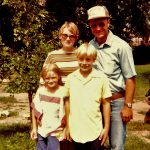 It is with great sadness that our family heard the news yesterday about our cousin, Larry Hein’s passing. Larry was the oldest child of my husband, Bob’s Uncle Eddie and Aunt Pearl Hein. Eddie passed away just three month and two weeks ago. Larry is dad to Dalton and Destiny, brother to Kim Arani, and brother-in-law to Mike Arani. It has been a rough few months for this family. My heart just aches for all of them.
It is with great sadness that our family heard the news yesterday about our cousin, Larry Hein’s passing. Larry was the oldest child of my husband, Bob’s Uncle Eddie and Aunt Pearl Hein. Eddie passed away just three month and two weeks ago. Larry is dad to Dalton and Destiny, brother to Kim Arani, and brother-in-law to Mike Arani. It has been a rough few months for this family. My heart just aches for all of them.
Larry was born and raised in Forsyth, and never really thought about going anywhere else. I remember on the visits my husband, Bob and our family took to visit our Forsyth family, Larry loved spending time with his cousins. Grandma and Grandpa 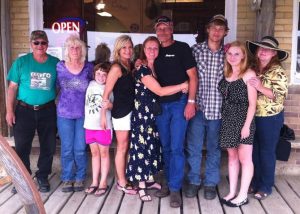 Hein has a ranch north of Forsyth, and the grandkids all loved to go out and play. There were three of the younger grandkids, Larry, Scott, and Kim Hein, and they spent as much time at their grandparents’ house as they could. It’s the normal way of kids, isn’t it. Whenever we went to visit, my kids couldn’t wait to play with their cousins. Even though Larry, Scott, and Kim were older than my girls, Corrie and Amy, they all played the kinds of games the younger kids wanted to play, and I always found that a sweet thing for
Hein has a ranch north of Forsyth, and the grandkids all loved to go out and play. There were three of the younger grandkids, Larry, Scott, and Kim Hein, and they spent as much time at their grandparents’ house as they could. It’s the normal way of kids, isn’t it. Whenever we went to visit, my kids couldn’t wait to play with their cousins. Even though Larry, Scott, and Kim were older than my girls, Corrie and Amy, they all played the kinds of games the younger kids wanted to play, and I always found that a sweet thing for  those kids to do. I miss those days.
those kids to do. I miss those days.
Larry was a mechanic in Forsyth, Montana, where he owned Hein Repair for a number of years now. He worked on just about anything that needed repair. He was a great dad, brother, and son. He was an asset to his community, and well liked by all who knew him. Yesterday, a heart attack took Larry from all those who loved him, and left an empty place in all our hearts. We are all now left to pick up the pieces of yet another heartbreaking loss in the family. My thoughts go out to this precious family. I am praying for comfort for all of them as they grieve this new loss and comfort each other on this sad time. Rest in peace Larry until we all meet again. We love and miss you very much.
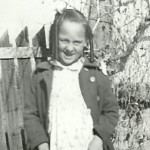 My husband, Bob’s aunt, Esther Hein is the oldest child of her parents, Walt and Vina Hein. She was also the middle child of her mother, who had two children from another marriage. Because of the age difference the children, the older children, Marion and Walt were both married while Esther was just a little girl, so she grew up being the oldest child for the most part. Besides her two half-siblings, Esther had two brothers, Edward and Bernard Hein.
My husband, Bob’s aunt, Esther Hein is the oldest child of her parents, Walt and Vina Hein. She was also the middle child of her mother, who had two children from another marriage. Because of the age difference the children, the older children, Marion and Walt were both married while Esther was just a little girl, so she grew up being the oldest child for the most part. Besides her two half-siblings, Esther had two brothers, Edward and Bernard Hein.
The family lived outside of Forsyth, Montana on a ranch, and with the winters in Montana being what they often are, getting her to school wasn’t always easy, so during the winter months, Esther often lived with her brother Walt and his wife Joann, so she could attend school regularly. Those were special days for Esther, who became very close friends with Walt and Joann, as well as little sister. Of course, as with any child, Esther could be trying, to which Joann would exclaim, “Don’t Esther!” A situation that remained with Joann, even when Alzheimer’s Disease stole many of her memories. The three of them would remain close for the rest of their lives. Though they lived far away from each other for their entire adult lives, they talked on the phone often, and visited as often as they could.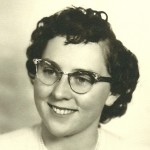
Esther is an artist, and many of her pieces of artwork adorned the homes of her family. She is also a good seamstress, and made curtains for Walt and Joann’s bathroom, which they loved very much. She especially liked to paint on unusual objects, like sawblades. She would create beautiful landscapes on both straight sawblades, as well as round sawblades. The effect was amazing. The way that something so mechanical could also take on a rustic look was amazing. Her artistic ability was something that made her brother, Walt very proud. He spoke of it often, and was always quick to point out her paintings to people who visited the house. He proudly told them that the artist was his little sister. Today is Esther’s birthday. Happy birthday Esther!! Have a great day!! We love you!!
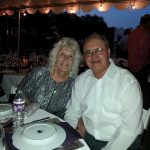 Birthdays are supposed to be happy events, and most are, but the birthdays that come after someone has passed away can be some of the hardest days we will ever spend. Losing a loved one leaves the family with nothing but empty space and memories. The place our loved one once filled with their presence, is now filled only with memories of someone who was, and still is, so important to us. Each first, as it arrives makes the emptiness even more pronounced. The first holiday, birthday, family dinner, or even just the mundane tasks they always helped with, are among the worst days of our new reality, but I think it is the first of those events that will always be viewed as the worst.
Birthdays are supposed to be happy events, and most are, but the birthdays that come after someone has passed away can be some of the hardest days we will ever spend. Losing a loved one leaves the family with nothing but empty space and memories. The place our loved one once filled with their presence, is now filled only with memories of someone who was, and still is, so important to us. Each first, as it arrives makes the emptiness even more pronounced. The first holiday, birthday, family dinner, or even just the mundane tasks they always helped with, are among the worst days of our new reality, but I think it is the first of those events that will always be viewed as the worst.
On October 16, 2019, our uncle, Eddie Hein had a heart attack while working in his 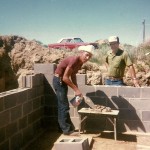 yard. Friends and neighbors, as will as his wife, Pearl and their grandson, Dalton, all tried to help, but it was too late. Eddie was gone, but his memory will be with his many friends and family members forever. Eddie was a sweet man with a heart of gold, who was always willing to help those in need. The people of Forsyth, Montana knew Eddie well. He was a friend to all. He would wave as he drove by, and help when it was needed. Eddie was known around town as someone who could always be counted on, no matter what the need. He was there to give a smile, a hug, a wave, or a hand. Someone said that Eddie was one of God’s great ones, and I agree.
yard. Friends and neighbors, as will as his wife, Pearl and their grandson, Dalton, all tried to help, but it was too late. Eddie was gone, but his memory will be with his many friends and family members forever. Eddie was a sweet man with a heart of gold, who was always willing to help those in need. The people of Forsyth, Montana knew Eddie well. He was a friend to all. He would wave as he drove by, and help when it was needed. Eddie was known around town as someone who could always be counted on, no matter what the need. He was there to give a smile, a hug, a wave, or a hand. Someone said that Eddie was one of God’s great ones, and I agree.
Eddie loved vintage cars, and had his own 55 Chevy that he thoroughly enjoyed. It wasn’t just the cars either, 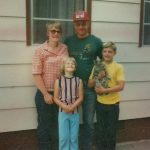 because he loved old tractors too. Eddie loved living next to the Yellowstone River. It was almost like living in the country, and it gave them enough room to have their garden. Eddie could fix just about anything. He loved tinkering around in his shop. If you needed a part for something, there was a good chance that Eddie had it or could make it. He was a great carpenter, and could help build just about anything. Eddie was a bit of a Jock of all trades, and the people of Forsyth counted on him for many things. That is a big part of what makes his passing so sad for everyone, and the only consolation is that since Eddie was a Christian man, we know that we will see him again soon. Happy first Heavenly Birthday Eddie. We love and miss you very much.
because he loved old tractors too. Eddie loved living next to the Yellowstone River. It was almost like living in the country, and it gave them enough room to have their garden. Eddie could fix just about anything. He loved tinkering around in his shop. If you needed a part for something, there was a good chance that Eddie had it or could make it. He was a great carpenter, and could help build just about anything. Eddie was a bit of a Jock of all trades, and the people of Forsyth counted on him for many things. That is a big part of what makes his passing so sad for everyone, and the only consolation is that since Eddie was a Christian man, we know that we will see him again soon. Happy first Heavenly Birthday Eddie. We love and miss you very much.
 On the first trip I made to Forsyth, Montana with my husband, Bob Schulenberg’s family, I was introduced to his family there…among them, Eddie Hein, Bob’s uncle…his dad’s half-brother. That first trip was followed by yearly trips for many years to come. We loved going up for visits, and we were always made to feel welcome. Eddie was a quiet man…soft spoken, but with a big heart. You always felt accepted by him. Eddie had a great big smile, and a laugh that lit up his face, and he liked to laugh. I will miss his smile, and his big hearted kindness. There was never the formality of calling Eddie and Pearl, uncle and aunt, because they weren’t that much older than many of their nieces and nephews were. Even though we didn’t see them as much lately as we used too, it was always good knowing that he was there. Now, suddenly, Eddie is gone. He passed away yesterday, even though it seemed that his health was improving after his stroke of a few years ago. We will all miss him very much.
On the first trip I made to Forsyth, Montana with my husband, Bob Schulenberg’s family, I was introduced to his family there…among them, Eddie Hein, Bob’s uncle…his dad’s half-brother. That first trip was followed by yearly trips for many years to come. We loved going up for visits, and we were always made to feel welcome. Eddie was a quiet man…soft spoken, but with a big heart. You always felt accepted by him. Eddie had a great big smile, and a laugh that lit up his face, and he liked to laugh. I will miss his smile, and his big hearted kindness. There was never the formality of calling Eddie and Pearl, uncle and aunt, because they weren’t that much older than many of their nieces and nephews were. Even though we didn’t see them as much lately as we used too, it was always good knowing that he was there. Now, suddenly, Eddie is gone. He passed away yesterday, even though it seemed that his health was improving after his stroke of a few years ago. We will all miss him very much.
Bob and I went to Forsyth, two years ago, after his stroke, and I am so glad that we made that trip. It is a trip I will cherish now. Eddie and Pearl, his wife, were both is good spirits, and the trip was so much fun. His mobility was good, even after the stroke, and he seemed just like his old self. I was glad. Pearl just beamed. She was so happy to have him beside her…something I understand after my own husband’s heart attack. You learn to set aside things that don’t matter so much, and live for the day you are in. That’s what Eddie and Pearl were doing too. There were times that Pearl wanted to declutter…we all need to do that from time to time, but  Eddie wanted her to let that go, and just be together. I think I understand where he was coming from, as I’m sure Pearl does too. Stuff can be cleaned out anytime, but time cannot be relived. Memories are always with us, but we have to live them to have them first, to make the memories. Eddie and Pearl lived them.
Eddie wanted her to let that go, and just be together. I think I understand where he was coming from, as I’m sure Pearl does too. Stuff can be cleaned out anytime, but time cannot be relived. Memories are always with us, but we have to live them to have them first, to make the memories. Eddie and Pearl lived them.
They were married on July 15, 1967, and their marriage was blessed with two children, Larry on May 17, 1969; and Kim on June 27, 1971. Life was good. Eddie worked for many years at Peabody Coal in Colstrip, Montana; while Pearl worked at the IGA in Forsyth, until they both retired. This past July they celebrated their 52 wedding anniversary. Eddie and Pearl had a house in Forsyth, Montana, along the Yellowstone River. They raised vegetables, and Pearl canned they every year. Eddie had a garage where he could tinker, and he loved caring for the garden. He was also a capable carpenter. He turned their mobile home into a beautiful house, with a fireplace made from area stone. It was beautiful. Eddie was always willing to help other people with their own projects, including when his brother, Walt Schulenberg, my father-in-law was building his house outside of Casper, Wyoming. As the years passed, Eddie and Pearl became grandparents. They loved their time with those kids, and I’m sure the kids loved the time with them.

It’s hard to believe that Eddie is gone now. There will always be an empty place that belonged to him. I am thankful for the memories of our trips to Forsyth, and the wonderful visits to Eddie and Pearl’s house. I can picture it now, sitting around their table, drinking coffee, and listening to the stories of our lives. It didn’t matter what we talked about…their lives or our lives, we were reconnecting, and that always felt good. I will really miss those times. It saddens me to have the aunts and uncles leaving us. They contribute so much to our lives, and that rich heritage is slipping away with each one who goes home to Heaven. Still, Eddie, like so many others who have gone on before us, is in our future now, not our past. We will see him again. Rest in peace Eddie. We love and miss you already.
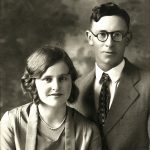 My husband, Bob’s grandparents, Robert and Nettie Knox were married in Forsyth, Montana on this day in 1928. It’s strange how things come to pass. Nettie was born in Clyde Park, Montana, but Robert was born in Prosser, Washington. Had Robert’s family not moved to Montana when he was young, they likely would never have met. Distances back then prevented things like yearly vacations to tour the United States. Nevertheless, like my own Robert, who was born in Miles City, Montana; while I was born in Superior, Wisconsin; and we met in Casper, Wyoming, where both families lived then. Robert Knox and Nettie Noyes both ended up in the Rosebud area, and the rest was history.
My husband, Bob’s grandparents, Robert and Nettie Knox were married in Forsyth, Montana on this day in 1928. It’s strange how things come to pass. Nettie was born in Clyde Park, Montana, but Robert was born in Prosser, Washington. Had Robert’s family not moved to Montana when he was young, they likely would never have met. Distances back then prevented things like yearly vacations to tour the United States. Nevertheless, like my own Robert, who was born in Miles City, Montana; while I was born in Superior, Wisconsin; and we met in Casper, Wyoming, where both families lived then. Robert Knox and Nettie Noyes both ended up in the Rosebud area, and the rest was history.
Grandma always liked to tease grandpa that she was older and wiser than he was…at 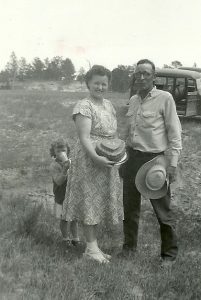 least from June 30th to November 28th, when he caught up to her in years again. It was just one of the ways Grandma liked to tease Grandma. Their marriage would have it’s ups and downs, just like any other marriage. They lost their first child, Everett Knox at birth, and it was then that Grandma decided that any subsequent children would be born in the hospital, not at home. Grandma entered the hospital with my future mother-in-law, 40 days before she was born. Thankfully, $5.00 a day covered her hospital bills. I don’t think she could have been able to afford todays rate just to make sure she had the baby in the hospital. Their daughter, Joann Knox’s birth went off without a hitch, nevertheless, I don’t think Grandma could get comfortable with the idea of having another baby…at lease not for the next 14 years, when she got pregnant with their daughter, Linda, who’s birth also went off without a hitch. Margaret “Margee” would follow just a little over two years later, and their family was complete. Nevertheless, Grandma’s belief that her son would have survived, had she been delivered by Caesarean Section, prompted her to distrust home-births for the rest of her life. Grandma and Grandpa Knox, went on to have 8 grandchildren; each of them
least from June 30th to November 28th, when he caught up to her in years again. It was just one of the ways Grandma liked to tease Grandma. Their marriage would have it’s ups and downs, just like any other marriage. They lost their first child, Everett Knox at birth, and it was then that Grandma decided that any subsequent children would be born in the hospital, not at home. Grandma entered the hospital with my future mother-in-law, 40 days before she was born. Thankfully, $5.00 a day covered her hospital bills. I don’t think she could have been able to afford todays rate just to make sure she had the baby in the hospital. Their daughter, Joann Knox’s birth went off without a hitch, nevertheless, I don’t think Grandma could get comfortable with the idea of having another baby…at lease not for the next 14 years, when she got pregnant with their daughter, Linda, who’s birth also went off without a hitch. Margaret “Margee” would follow just a little over two years later, and their family was complete. Nevertheless, Grandma’s belief that her son would have survived, had she been delivered by Caesarean Section, prompted her to distrust home-births for the rest of her life. Grandma and Grandpa Knox, went on to have 8 grandchildren; each of them 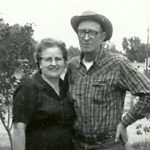 having a granddaughter born on their birthday…Corrie on Grandma’s birthday, and Machelle on Grandpa’s.
having a granddaughter born on their birthday…Corrie on Grandma’s birthday, and Machelle on Grandpa’s.
Married life wasn’t always easy for them. They lived through many tough times in their own life, as well as, economic times. Nevertheless, they persevered, and their marriage lasted until Grandpa’s passing in 1985. Grandma never really wanted to continue on after his passing, but she stuck it out until 1990. If they were still alive today, which wul have put them in their 110s, they would have been married 91 years today. I know they are celebrating in Heaven. Happy 91st Anniversary Grandma and Grandpa Knox. We love and miss you very much.
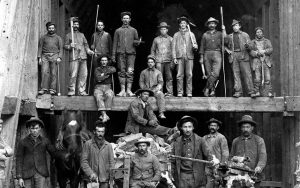 It is in times of greatest need, that people seem to best show that they can pull together to accomplish the greatest tasks. During World War I, the city of Butte, Montana was already a unionized industrial city with a population of 91,000 people. The city was home to one of the largest mining operations in the world. Butte was home to a copper mine system consisting of the Granite Mountain and Speculator Mines, and because of the heightened need for copper at that time, the abundance of employment opportunities drew workers from every corner of the world. The influx of people from other corners meant that more than 30 languages were spoken among the city streets. “No Smoking” signs posted in the mines were printed in 16 different languages, so that there was no mistaking the dangers.
It is in times of greatest need, that people seem to best show that they can pull together to accomplish the greatest tasks. During World War I, the city of Butte, Montana was already a unionized industrial city with a population of 91,000 people. The city was home to one of the largest mining operations in the world. Butte was home to a copper mine system consisting of the Granite Mountain and Speculator Mines, and because of the heightened need for copper at that time, the abundance of employment opportunities drew workers from every corner of the world. The influx of people from other corners meant that more than 30 languages were spoken among the city streets. “No Smoking” signs posted in the mines were printed in 16 different languages, so that there was no mistaking the dangers.
In April of 1917, the United States’ involvement in World War I was in its fourth month, and Butte mines increased their production of copper by operating around the clock, working the 14,500 miners like mules in order to meet the ever increasing demand. Unfortunately, this also brought steadily deteriorating safety conditions. Many of the miners were sleeping in shifts, so the beds in the boarding houses often never went cold. Despite these demanding work conditions, Butte miners worked with a pride and determination seldom found above ground, let alone a half-mile below the surface of the earth. They felt the weight of their duty to the war effort, and they gladly performed their jobs to the best of their abilities. Each day, the men were lowered into the mine, and the previous crew was brought out.
On the evening of June 8, 1917, 410 men were lowered into the Granite Mountain shaft to begin another backbreaking night shift. The exiting day shift had been tasked with the process of lowering a three-ton electric 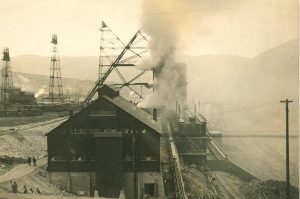 cable down the shaft to complete work on a sprinkler system designed to protect the mine against fire. All seemed to be going well, but at 8:00 pm the cable slipped from its clamps. As it fell into a tangled coil below the 2400 foot level of the mine, the lead covering was torn away. The torn covering exposed a large portion of oiled paraffin paper, which was used to insulate the cable. Unfortunately, the oiled paraffin paper was also highly flammable. At 11:30 pm four men went down to examine the cable. One of the men accidentally touched his handheld carbide lamp to the oiled paraffin insulation, which immediately ignited. The flame spread quickly to the shaft timbers. The Granite Mountain and Speculator shafts immediately filled with thick, toxic smoke.
cable down the shaft to complete work on a sprinkler system designed to protect the mine against fire. All seemed to be going well, but at 8:00 pm the cable slipped from its clamps. As it fell into a tangled coil below the 2400 foot level of the mine, the lead covering was torn away. The torn covering exposed a large portion of oiled paraffin paper, which was used to insulate the cable. Unfortunately, the oiled paraffin paper was also highly flammable. At 11:30 pm four men went down to examine the cable. One of the men accidentally touched his handheld carbide lamp to the oiled paraffin insulation, which immediately ignited. The flame spread quickly to the shaft timbers. The Granite Mountain and Speculator shafts immediately filled with thick, toxic smoke.
There was a mad scramble to find a way of escape. Just over half of the men working in the Granite Mountain shaft were able to find an escape to the surface. One group of 29 men built a bulkhead to isolate themselves from the smoke and gas. They stayed there for 38 hours before making their way to safety. At the 2254 foot level, another group of 8 men were found behind a makeshift bulkhead over 50 hours from the start of the fire. Two of these men died shortly before their rescue, but the other six were recovered safely. Though the intensity of the fire cannot be disputed, only two men were actually burned to death in a rescue attempt at the onset of the blaze. The rest were simply trapped and overcome by the noxious, suffocating fumes. By the close of the rescue operation on June 16, 1917, eight days after the fire had begun, the death toll had reached its final tally of 168 men.
The Granite Mountain and Speculator Mine Fire was the worst disaster in metal mining history. And we could leave it at that, but then we would be overlooking a remarkable accomplishment…the rescue mission. Over the 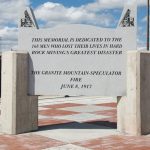 course of just 7 days, rescue crews succeeded in searching over 30 miles of drifts and crosscuts, and at least 15 miles of stopes, raises, and manways. Townspeople turned out in droves to help in whatever way the could. All this was done in mine shafts saturated with carbon monoxide and dense, tar-laden smoke. In all, 155 bodies were recovered and removed, all without the loss of a single rescue worker. Despite the tremendous damage the fire caused to the Granite Mountain Mine, it did not stop the work being done there. Copper ore continued to be mined until the mine’s close in 1923. The Butte mines produced the copper that helped electrify America and win World War I. Through this horrible tragedy, Butte received a very special moniker. The city was being called “The Richest Hill on Earth, referencing the soul and determination of the community, rather than the value of the ore beneath its feet.”
course of just 7 days, rescue crews succeeded in searching over 30 miles of drifts and crosscuts, and at least 15 miles of stopes, raises, and manways. Townspeople turned out in droves to help in whatever way the could. All this was done in mine shafts saturated with carbon monoxide and dense, tar-laden smoke. In all, 155 bodies were recovered and removed, all without the loss of a single rescue worker. Despite the tremendous damage the fire caused to the Granite Mountain Mine, it did not stop the work being done there. Copper ore continued to be mined until the mine’s close in 1923. The Butte mines produced the copper that helped electrify America and win World War I. Through this horrible tragedy, Butte received a very special moniker. The city was being called “The Richest Hill on Earth, referencing the soul and determination of the community, rather than the value of the ore beneath its feet.”
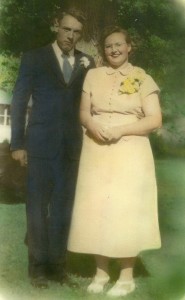 World War II had been ended four years earlier, and people were getting back to their lives. The year was 1949, and the date was June 6th. My future in-laws had other things on their minds. Today, June 6, 1949 was the day they would be married. I wonder if they were even aware of the significance of the day, but if they were, I’m sure they paused for a few moments to remember the men who that very day, just five years earlier, when one of the biggest operations in World War II was carried out. The war was over, but the aftermath was still very fresh on everyone’s minds. Still, life goes on, and while we commemorate the important days in history, we can’t usually avoid of all of them when it comes to life events that come after.
World War II had been ended four years earlier, and people were getting back to their lives. The year was 1949, and the date was June 6th. My future in-laws had other things on their minds. Today, June 6, 1949 was the day they would be married. I wonder if they were even aware of the significance of the day, but if they were, I’m sure they paused for a few moments to remember the men who that very day, just five years earlier, when one of the biggest operations in World War II was carried out. The war was over, but the aftermath was still very fresh on everyone’s minds. Still, life goes on, and while we commemorate the important days in history, we can’t usually avoid of all of them when it comes to life events that come after.
Weddings in those days were not the elaborate affairs they often are today, but rather were set to times when people might already be planning to be in town. My mother-in-law, Joanne (Knox) Schulenberg wore a simple light peach colored dress and flat shoes. For those who don’t know my mother-in-law, seeing her in a dress of any style 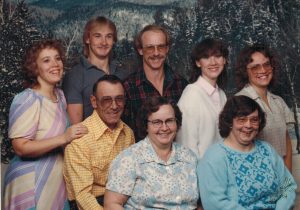 was amazing, because she practically lived on a horse, and dresses simply weren’t done. I never saw her in high heels, or any kind of a heel at all, so the flat white Mary Jane type of shoe was as dressy as it gets. My father-in-law, Walt Schulenberg, was equally out of character for his wardrobe style. He didn’t usually wear a suit unless he was going to a funeral. For that reason, seeing them dressed up shows just how special this day was to them. Of course, people in those days didn’t get married in some of the outlandishly casual outfits that we sometime see these days.
was amazing, because she practically lived on a horse, and dresses simply weren’t done. I never saw her in high heels, or any kind of a heel at all, so the flat white Mary Jane type of shoe was as dressy as it gets. My father-in-law, Walt Schulenberg, was equally out of character for his wardrobe style. He didn’t usually wear a suit unless he was going to a funeral. For that reason, seeing them dressed up shows just how special this day was to them. Of course, people in those days didn’t get married in some of the outlandishly casual outfits that we sometime see these days.
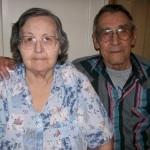
The day turned out beautifully, and while I’m not sure if theirs was an outdoor wedding or not, I rather doubt it, because in those days, you didn’t see very many of those, but I could be wrong too. Nevertheless, the day was sunny and without rain, and the wedding went off without a hitch, and their married life began. They would go on to have six children, four girls and two boys. Life would take the family from Forsyth, Montana to Casper, Wyoming in the end. While Dad left us in May of 2013, Mom was with us until January of 2018. Their love was never ending. Today would have been their 70th wedding anniversary. Happy anniversary in Heaven, Mom and Dad. We love and miss you very much.
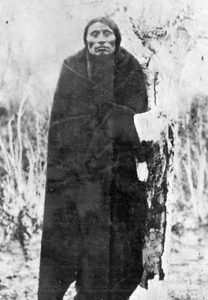 Little Wolf was a Cheyenne Indian who was often called “the greatest of the fighting Cheyenne.” Little Wolf was the chief of an elite Cheyenne military society called the Bowstring Soldiers. Little Wolf had demonstrated a rare form of bravery and a brilliant understanding of battle tactics from a very early age, which led to him becoming a trusted leader. His prowess showed first in conflicts with other Indians like the Kiowa, but even more in disputes with the United States Army, Little Wolf led or assisted in dozens of important Cheyenne victories.
Little Wolf was a Cheyenne Indian who was often called “the greatest of the fighting Cheyenne.” Little Wolf was the chief of an elite Cheyenne military society called the Bowstring Soldiers. Little Wolf had demonstrated a rare form of bravery and a brilliant understanding of battle tactics from a very early age, which led to him becoming a trusted leader. His prowess showed first in conflicts with other Indians like the Kiowa, but even more in disputes with the United States Army, Little Wolf led or assisted in dozens of important Cheyenne victories.
While it has not been confirmed, most historians agree that Little Wolf was probably involved in the disastrous Fetterman Massacre of 1866. In that battle, the Cheyenne lured the 80 American soldiers out of the fort in Wyoming, and wiped them out. Cheyenne attacks also forced the United States military to abandon Fort Phil Kearney along the Bozeman Trail, and Little Wolf is believed to have led the war party in torching of the fort. He was also a leading participant in the greatest of the Plains Indian victories, the Battle of the Little Bighorn in 1876.
Even with such an impressive list of victories to his credit, Little Wolf, like many of the other Plains Indian warriors, was finally forced to make peace with the White Man. After the horrendous loss at the Battle of the Little Bighorn, the army launched a major offensive. In 1877, the government sent Little Wolf to a reservation in Indian Territory. Little Wolf was disgusted with the conditions and the lack of supplies the Indians were forced to endure. In 1878 Little Wolf made up His mind to leave the reservation. His plan was to head north for the old Cheyenne territory in Wyoming and Montana. Chief Dull Knife and 300 of his followers went with him.
Little Wolf and Dull Knife made it clear that their intentions were peaceful, but the settlers in the territory we’re afraid they would attack. So, once again, the government sent cavalry forces that assaulted the Indians. Little Wolf’s skillful defensive maneuvers kept Cheyenne casualties low. When the band neared Fort Robinson, Nebraska, Dull Knife and some of his followers stopped there, but Little Wolf and the rest of the Cheyenne continued to march north to Montana.
In the spring of 1879, while still traveling north, Little Wolf and his followers were overtaken by a cavalry force 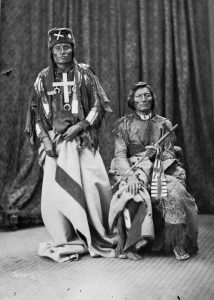 under the leadership of Captain W.P. Clark, who happened to be an old friend of Little Wolf’s. The confrontation could have easily turned violent, but with his force of warriors diminished and his people tired, Little Wolf was reluctant to fight the more powerful American army. Clark’s civilized and gracious treatment of Little Wolf helped convince the chief that further resistance was pointless, and he agreed to surrender.
under the leadership of Captain W.P. Clark, who happened to be an old friend of Little Wolf’s. The confrontation could have easily turned violent, but with his force of warriors diminished and his people tired, Little Wolf was reluctant to fight the more powerful American army. Clark’s civilized and gracious treatment of Little Wolf helped convince the chief that further resistance was pointless, and he agreed to surrender.
After returning to the reservation, Little Wolf briefly served as a scout for General Nelson A. Miles. However, during this time he disgraced himself among his people by killing one of his tribesmen. The formerly celebrated Cheyenne warrior lived out the rest of his life on the reservation but had no official influence among his own people. After all of his honorable leadership and years of respect among his peers, Little Wolf was, in the end, taken down by his one dishonorable act. People always remember the things you do wrong, but the things you do right seem to fade quickly away.
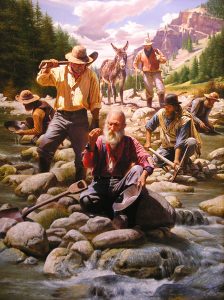 After the discovery of gold in California, people went crazy…mad really for gold. For twenty years, in fact, all the West was mad for gold. People packed up their lives, and headed west, hoping to dig their fortune out of the California dirt. At first, the people heading west were mostly men, but there were families that went too. It didn’t really matter who it was, when it came to gold, people were willing to fight to the death for what was theirs, or for what they wanted. Greed was the word of the day, and it was a disease that everyone in California had.
After the discovery of gold in California, people went crazy…mad really for gold. For twenty years, in fact, all the West was mad for gold. People packed up their lives, and headed west, hoping to dig their fortune out of the California dirt. At first, the people heading west were mostly men, but there were families that went too. It didn’t really matter who it was, when it came to gold, people were willing to fight to the death for what was theirs, or for what they wanted. Greed was the word of the day, and it was a disease that everyone in California had.
The Gold Rush brought honest citizens and outlaws alike to California. People had to be on guard at all times. If someone struck gold, they were an immediate target for anyone willing to steal their gold, or even to kill for it. The mad rush for gold soon spread to other areas of the United States. The gold-hunters, no longer content with California, began to prospect lower Oregon, upper Idaho, and Western Montana too. They figured that if one place had gold, why wouldn’t another place have it too. And with the slightest discovery, came the craziness of Gold Dust Fever.
With Gold Fever came the sinister figure of the trained desperado, the professional bad man. The business of 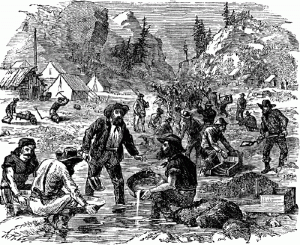 being an outlaw was turned into one highly organized profession that was relatively safe and extremely lucrative. There was wealth to be had for the asking or the taking, and these men, and sometimes women, were willing. Each miner had his buckskin purse filled with native gold. This dust was like all other dust. It could not be traced nor identified; and the old saying, ”’Twas mine, ’tis his,” might here of all places in the world most easily become true. There were no checks, drafts, or currency, as we know it now. The normal means by which civilized men keep a record of their property transactions, were unknown. The gold scales established the only currency, and each man was his own banker, obliged to be his own peace officer and the defender of his own property. It was a wild world. It was a world mad for gold.
being an outlaw was turned into one highly organized profession that was relatively safe and extremely lucrative. There was wealth to be had for the asking or the taking, and these men, and sometimes women, were willing. Each miner had his buckskin purse filled with native gold. This dust was like all other dust. It could not be traced nor identified; and the old saying, ”’Twas mine, ’tis his,” might here of all places in the world most easily become true. There were no checks, drafts, or currency, as we know it now. The normal means by which civilized men keep a record of their property transactions, were unknown. The gold scales established the only currency, and each man was his own banker, obliged to be his own peace officer and the defender of his own property. It was a wild world. It was a world mad for gold.
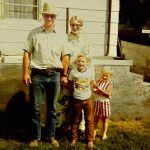 My husband, Bob’s Aunt Pearl Hein is a very ambitious person. For years, she has raised a garden, and canned tons of vegetables. She and Uncle Eddie have long been very busy people…maybe too busy sometimes. Pearl worked for many years at the IGA store in Forsyth, Montana, and pretty much became vital to the functioning of that place. That did make it hard for Pearl to entertain, and at least when we were in town, she always enjoyed having everyone come over for dinner. We didn’t get to Forsyth often, and she liked to make our visit very special. And she did make our visits special…not just because she is a great cook, but because she always made us feel welcome. Going to visit Eddie and Pearl was always a highlight of our visits to Forsyth.
My husband, Bob’s Aunt Pearl Hein is a very ambitious person. For years, she has raised a garden, and canned tons of vegetables. She and Uncle Eddie have long been very busy people…maybe too busy sometimes. Pearl worked for many years at the IGA store in Forsyth, Montana, and pretty much became vital to the functioning of that place. That did make it hard for Pearl to entertain, and at least when we were in town, she always enjoyed having everyone come over for dinner. We didn’t get to Forsyth often, and she liked to make our visit very special. And she did make our visits special…not just because she is a great cook, but because she always made us feel welcome. Going to visit Eddie and Pearl was always a highlight of our visits to Forsyth.
Pearl married Bob’s uncle Eddie on July 15, 1962, and they had two children, Larry Hein and Kimberly (Hein) Arani. They were then busily raising their family and spending time with siblings and parents. When Pearl’s parents needed help i their later years,she was right there to help them, often spending long hours at their homes. I remember many times that they were not able to take vacations because they were so busy. Now that they are both retired, they have more time to travel a little, and they have made a  couple of trips to Texas to visit their daughter, who lives there. I like that they can get away sometimes to a warmer climate, and I’m sure Kim likes it too.
couple of trips to Texas to visit their daughter, who lives there. I like that they can get away sometimes to a warmer climate, and I’m sure Kim likes it too.
Their son, Larry and his family still live in Forsyth, and for them as well as Eddie and Pearl, that will always be home. I’m not sure any of them will ever live anywhere else, and I can understand that. Forsyth is a cute little town, with a rich history. The family, from many branches, has roots there. While none of my own family were born there, Forsyth, and all of Bob’s family who are still there, will always hold a special place in my heart. And Pearl had a big part in those memories. Today is Pearl’s birthday. Happy birthday Pearl!! Have a great day!! We love you!!

